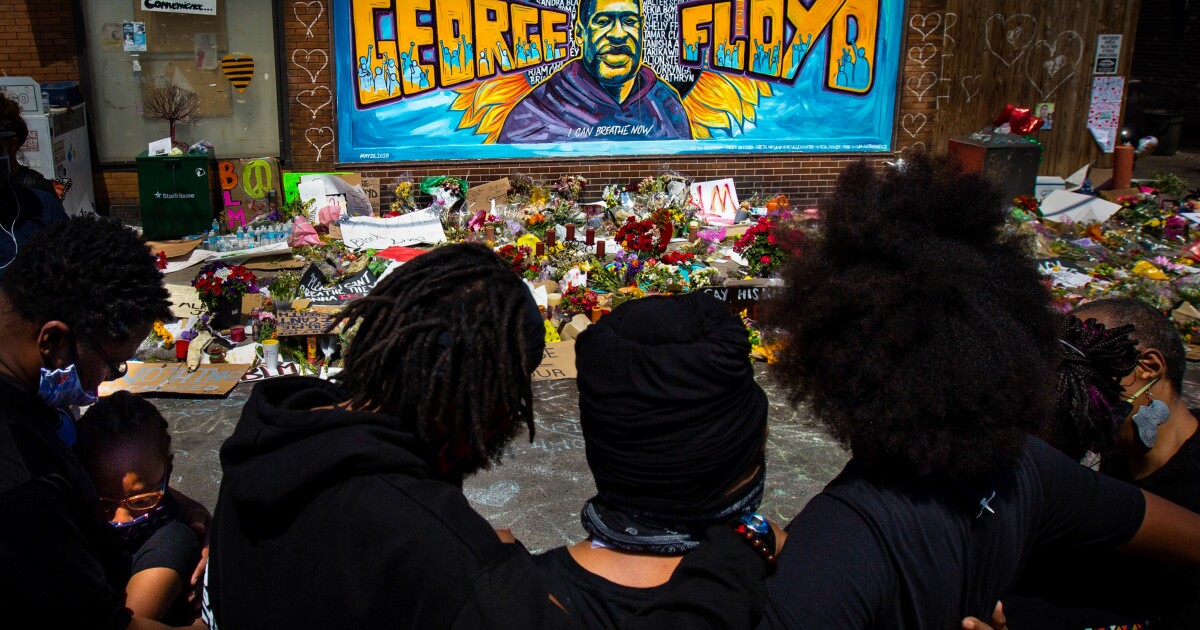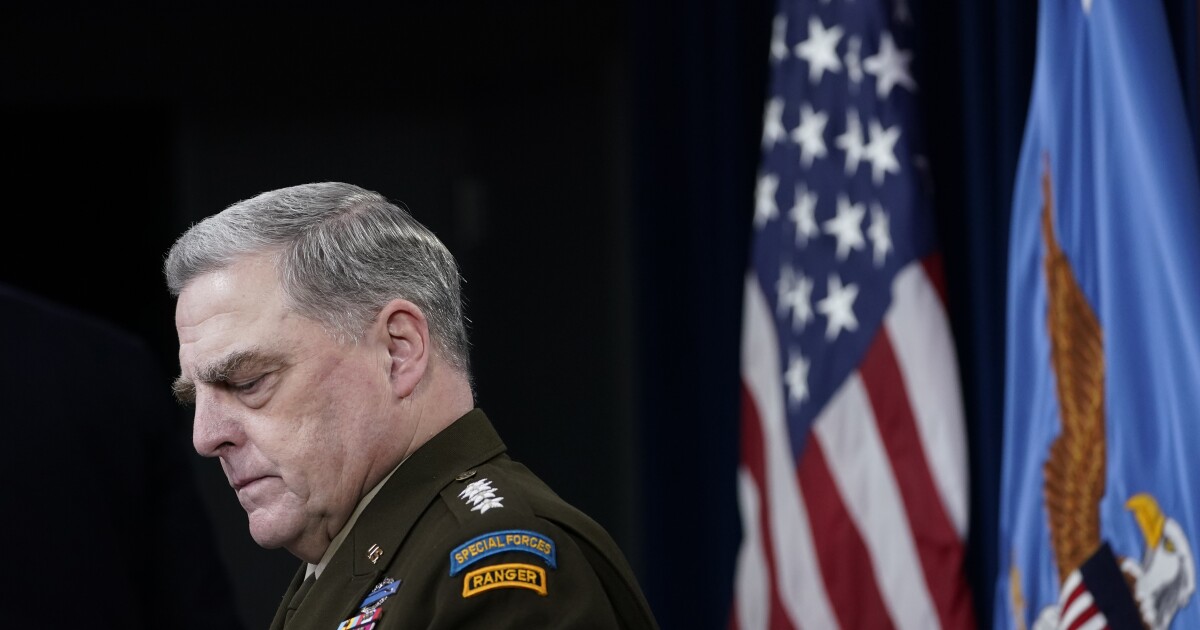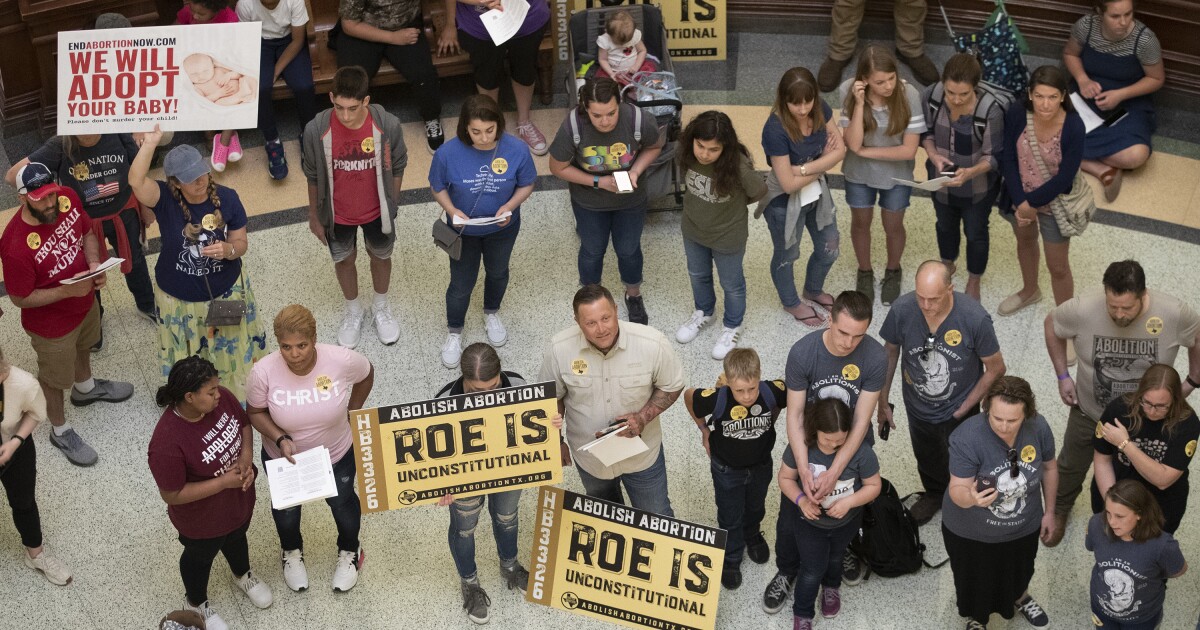Police killed their loved ones. Now they’re hopeful of a conviction of the officer charged in death of George Floyd

Philonise Floyd wrapped his arm around Gwen Carr’s shoulder, staring into the throng of television cameras outside the Hennepin County Government Center.
Before the news conference on a recent afternoon, the two — bound by the grief of losing a loved one at the hands of police — had only met a few times.
Carr, whose son, Eric Garner, was killed by a police officer’s chokehold in New York in 2014, traveled here in the days after George Floyd, Philonise’s older brother, died last May under the knee of a police officer.
They cried together and prayed together. And now, they were together, again, publicly calling for justice.
“One thing I can tell you,” Philonise said, looking at Carr, “after we get the verdict — after we get this conviction — we will be able to breathe.”
As the nation focuses on the final days of the murder trial of former Minneapolis Police Officer Derek Chauvin, who kneeled on Floyd’s neck for more than nine minutes, so too do the families of dozens of other Black people killed in recent years by police, many of whom, like Floyd and Garner, had their final breaths captured on video that rocketed across the country.
Some relatives, including Carr, have traveled here for Chauvin’s trial, and many others are transfixed from afar. Following the case, they say, reminds them of their own loss and of other families who know the same sort of pain — a fraternity of shared heartbreak that continues to grow.
Just a week ago, a police officer shot and killed 20-year-old Daunte Wright during a traffic stop a little more than 10 miles from the courthouse where Chauvin is on trial.
The Brooklyn Center, Minn., officer, who officials said mistook her gun for her Taser, has been charged with second-degree manslaughter for firing on Wright, who was unarmed.
For several days, #JusticeForDaunte trended on Twitter, the latest in a devastatingly long list of young Black people killed by police, a list now seared into the national psyche.
Surviving family members remind the public that each of the lives was so much more than a hashtag — those killed were often children who loved to tell jokes, men and women who loved their mothers deeply and who adored the outdoors.
A protester outside the Brooklyn Center Police Department in Minnesota calls for justice for Daunte Wright and George Floyd.
(Jason Armond / Los Angeles Times)
Their stories often focus on how they died, then are forgotten, so for their surviving relatives, who are following Chauvin’s trial, and praying for a conviction, it is a way of seeking some small sliver of justice not only for Floyd, but also for their own loved ones.
“My family, we have the faith,” Philonise Floyd said about a conviction. “We’re going to get through this.”
Jurors are set to begin deliberating after closing arguments Monday on the criminal charges leveled against Chauvin — manslaughter, second-degree murder and third-degree murder — and perhaps no verdict since the time of Rodney King is likely to have higher stakes for shaping the future of race and policing in the nation than this one.
“It’s very important that marginalized minorities in America get their day in court so we can live up to our promise of liberty and justice for all,” said Benjamin Crump, a civil rights attorney representing the Floyd and Wright families.
“That means for Daunte Wright,” Crump said, his voice booming during a news conference at a North Minneapolis church one day last week, “that means George Floyd, that means all the others. Whether it is Stephon Clark, Michael Brown, Eric Garner, Terence Crutcher, Alton Sterling, Laquan McDonald, Philando Castile, Corey Jones, Rekia Boyd … so many of our children have been killed by the very people who are supposed to protect and serve them.”
Nine-hundred thirty miles south in Dallas, another civil rights attorney, Daryl Washington, who has represented families of Black people killed by police, including Jordan Edwards and Botham Jean, has watched the Chauvin trial on television every day.
Edwards, a high school student from the Dallas area, was shot dead in 2017 by a white officer who fired a rifle into a car as he and his brothers were pulling away from a high school house party.
Jean was killed in his own apartment in Dallas by an off-duty white officer, who says she mistook the apartment for her own home, which was a floor below.
Both officers were convicted of murder — an exceedingly rare outcome in police shooting cases.
“But with those convictions, we see it as a form of justice for all the other Black families who have not seen their day in court,” Washington said.
Some who have suffered personal grief find it too painful to monitor the daily proceedings in Minneapolis.
For Tiffany Crutcher, whose twin brother, Terence, was killed by a white police officer in Tulsa, Okla., five years ago, it’s too triggering to view Chauvin’s trial. It reminds her of the moment she learned the officer who shot her brother had been acquitted of manslaughter. Video showed Terence’s hands raised when the officer fired on him on a two-lane road.
“There will be no justice until use-of-force laws are changed,” Crutcher said. “There will be no justice until we empower agencies to truly help and protect all citizens of this country.”
Back in Minneapolis, the names of many of these victims are scrawled on walls around the Hennepin County Government Center.
Mock headstones at the “Say Their Names’ cemetery pay tribute to Black people killed by police.
(Jason Armond/Los Angeles Times)
At 38th Street and Chicago Avenue, where Floyd once pleaded with Chauvin to get off his neck and cried out for his mother, a metal Black Lives Matter fist the height of a streetlamp has been erected in the intersection, which is outlined by a flower garden.
And lining the perimeter of the garden are signs with the faces and names of Black people killed by police.
Justice for Tamir Rice
Justice for Breonna Taylor
Justice for Daunte Wright
“This is a club nobody wants to be a part of,” said Stevante Clark, who traveled to Minneapolis from Sacramento last week to support Wright’s family.
Clark’s brother, Stephon, was shot and killed by Sacramento police in 2018 after they responded to a call about a person breaking car windows. A law enforcement helicopter spotted him in his grandmother’s backyard, and officers entered and fatally shot him. He was unarmed and an iPhone was discovered nearby.
Stevante Clark, whose brother Stephon Clark was killed by police in Sacramento in 2018, traveled to Minneapolis to show support for the Wright family.
(Jason Armond / Los Angeles Times)
Prosecutors declined to file criminal charges against the officers.
“I’m here to let them know that they are not alone,” Clark said outside the Minneapolis church before Crump spoke. “I’m here for the family of George Floyd as well and the community here.”
He then spotted Wright’s family and Crump in the church parking lot and walked over to greet them.
Aubrey and Katie Wright, parents of Daunte Wright, stand with their family at a press conference.
(Jason Armond/Los Angeles Times)
Onstage in the church, Wright’s relatives embraced one another as they stood before a crowd of journalists.
Speaking through her tears, Daunte’s mother, Katie, demanded accountability — the highest accountability, she said — but stressed that the criminal charges against the officer who killed her son are of little consolation.
“There’s never going to be justice for us,” she said. “Justice would bring our son home to us, knocking on the door with his big smile. Coming in the house, sitting down eating dinner with us, going out to lunch, playing with his … almost 2-year-old son, giving him a kiss before he walks out the door.”






